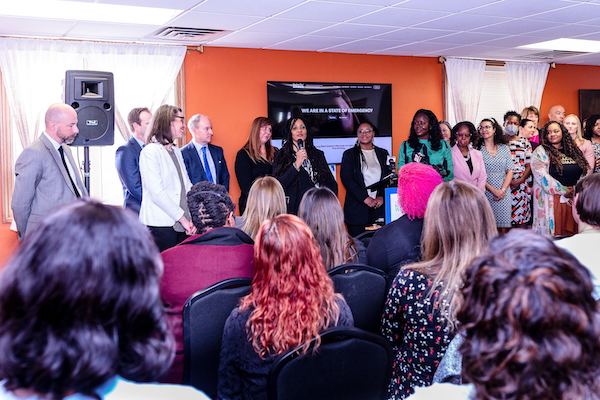
ConnectRx Wisconsin leaders mark first year of work to improve Black birth outcomes in Dane County

Photo credit: Hedi Rudd of Hedi Rudd Photography. Photo provided by the The Foundation for Black Women’s Wellness
An effort to improve Black birth outcomes in Dane County recently marked the one-year anniversary of the launch of a care coordination system that preliminary data show is making an impact.
Lisa Peyton-Caire, CEO and president for The Foundation for Black Women’s Wellness, called the work an “unprecedented partnership,” bringing together healthcare providers, public health workers, schools, the United Way of Dane County, the University of Wisconsin, doulas, community health workers and Black women-led organizations.
“This, to us, is a demonstration of how systems and communities must continue to work together,” she said. “That is the solution for disrupting disparities.”
Through the effort, Dane County healthcare providers screen pregnant patients for social determinants of health needs and refer Black patients to Connect Rx Wisconsin.
The care coordination system then connects the patients with community health workers and community-based organizations like the foundation. The foundation has a collective of doulas, who provide support and guidance to patients as they navigate their pregnancy and postpartum period.
Those involved in the effort spoke to Wisconsin Health News after a press conference at the foundation’s office that was livestreamed by SSM Health St. Mary’s Hospital in Madison.
Edited excerpts are below.
WHN: How did this effort get its start?
Tammy Quall, chief administrative and strategy officer at Access Community Health Centers and long-time member of the Dane County Health Council: The health council actually started back in 1999, originally, to address the issue of access to healthcare for women who did not qualify for any health insurance … For the first probably 15 years of the health council, we were focused on access to healthcare. It was back in 2016 when the health council really shifted the focus to health equity, with the desire to collectively work together to be able to impact an issue in our community that is really entrenched and that was identified as part of the ongoing community health needs assessments that are being conducted by our hospitals and public health.
Shiva Bidar-Sielaff, vice president and chief diversity officer at UW Health and on the staff team for the council: We not only looked at the issue that was the most pervasive as a disparity in our community, but we also thought about, ‘How do we change that approach and how do we really do this in a way that has not been done before?’ That is what led us to really making sure that we never forgot that our mantra needed to be, ‘Nothing about us without us,’ and that we were centering and always listening to Black women and their voices. So that led to the addition of the Black Maternal and Child Health Alliance (of Dane County) as a partner in the Dane County Health Council’s work and to our work with The Foundation for Black Women’s Wellness and EQT by Design, so that we could again make sure that we weren’t just a group of health systems and United Way (of Dane County) and public health talking about an issue without really listening to the voices of Black women.
WHN: What impact has it had so far?
Ariel Robbins, project director for the Dane County Health Council: What we’ve seen is an opportunity for us to identify needs early on in the perinatal journey. For instance, we’ve had one family where we identified that the financial resource strain was the (social determinants of health) need … We were able to work together collaboratively with The Foundation for Black Women’s Wellness and some other local organizations that were able to provide some financial resources to be able to help that family fix their vehicle … Because the vehicle was fixed, the mother was able to accept a job that was across town. It increased their hourly income wage by $5, which had a positive impact on the overall stress that she was feeling …
So really just trying to work together as a team to really not only identify the resources, but then sometimes it’s hard to actually get the resources into the families’ hands. That’s really the benefit of us working together, that we’re leveraging our collective power and our collective knowledge to be able to bridge that gap and to support the real needs that families have today.
Gabe Doyle, chief health initiatives officer at The Foundation for Black Women’s Wellness: One thing that’s really exciting is that we’re infusing Black community health workers and Black doulas into the care teams. And so there’s increased communication between traditional medical providers and folks that look like the clients we’re serving …
When we think about outcomes early on, this is generational work. So by no means are we saying that this is definitive proof that ConnectRx is working. But we are excited about some of the early indicators … For example, in year one, 90-percent-plus of babies born to doula-assisted births reached optimal gestational age, 80-percent-plus of our births born into ConnectRx that were doula-assisted reached a healthy birth weight and 70 percent of our doula-supported clients were able to avoid medical interventions like c-sections and inductions … This is going to take a long-term commitment and collective impact, but we are very excited to see some of these early indicators showing that bringing in Black women community health workers, Black doulas, having the support of the Dane County Health Council and all of its partners, having our academic partners really focusing in on the right evaluation metrics, that we’re starting to see in year one that this investment was the right investment at the right time for the right people.
Lisa Peyton-Caire, CEO and president for The Foundation for Black Women’s Wellness: Data from Public Health Madison & Dane County show us that there are approximately 600 births by Black women and Black birthing persons each year in the county. And we’ve supported 400 Black families through Connect Rx in one year. So we are really touching the population most at risk, most in need of these services, and that’s very promising to achieve in one year.
We know that this is a long-standing problem … Funding has gone through many, many various efforts. But never have we seen this quickly promising results and data. Now we’ve got much more evaluation to do … but this is the most significant sign that we’ve seen in 20 years that a solution we co-created with the community and health systems, Black women and community-based providers is moving in the right direction and that we’re hitting the population we intend to hit. That’s very encouraging and something that we want folks to pay attention to because we’ve been in the media for 20 years on the wrong side of the data. And in 10 years, we want to be on the right side of the data.
WHN: How do you plan to expand this effort and sustain it?
Dr. Tiffany Green, co-chair of the Black Maternal and Child Health Alliance of Dane County and assistant professor of population health sciences and OB-GYN at the University of Wisconsin School of Medicine and Public Health: We have significant financial commitments from the partners on the Dane County Health Council and some philanthropy. But at the end of the day, we need continued funding to be able to support this care model and to expand it. Frankly, we hope that when this expands to address the needs of Black birthing people and pregnant people in other systems that we have support from those health systems, that we have support from funders … Of course, when you’re able to create an evidence-based model, there are opportunities for federal spending to be able to come in and support this program, i.e. Medicaid.
Lisa Peyton-Caire, CEO and president for The Foundation for Black Women’s Wellness: We’ve been working on this problem in Dane County for several decades now, trying to crack the code on how to dismantle Black birth disparities. So with this early success, we’re feeling very optimistic, but very committed to continuing to drill down on this population. We’re not ready to shift gears yet and focus on other populations. So we do have, in our rearview mirror, a focus, a knowledge and understanding that what we’re creating absolutely could and should be replicated. We don’t go into this work without the lens of knowing that we’re creating a model. We made a model in Wisconsin.
For decades, we’ve been tired of trailing the nation, being amongst the top worst. In 2018, we were probably first in the nation for Black infant mortality. That’s been our designation now for far too long. And until we undo that designation as the worst in the nation for Black women’s health, among the worst for Black maternal and child health, among the worst for Black infant mortality, and in a very compromised position from Black maternal mortality, we’re staying committed to this issue until we see measurable change. We know that’s going to take time. As Gabe always says, this is a generational approach. It’s taken a generation two or three to get here. We don’t want to take a whole generation to get to the answer, but we’re staying focused and we’re learning and gleaning lessons that in time, yes, will be applicable to others as we expand and make this a viable option for making Wisconsin first and best in the nation for maternal and child health. That’s our goal.
This article first appeared in the Wisconsin Health News daily email newsletter. Sign up for your free trial here.





